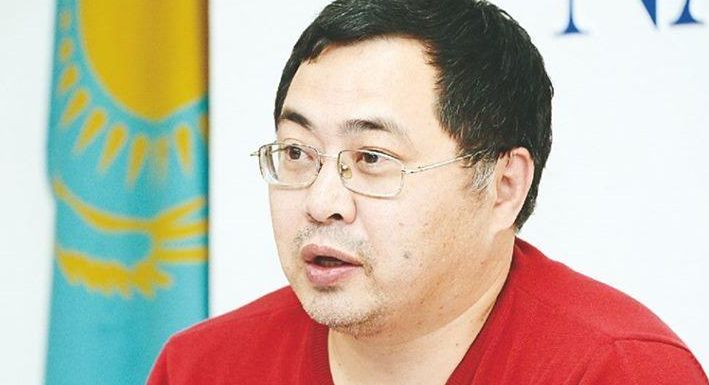 Kazakh police on August 20, 2015, detained an activist who said on his Facebook page that he wanted to meet publicly with local government officials, writes HRW.org.
Kazakh police on August 20, 2015, detained an activist who said on his Facebook page that he wanted to meet publicly with local government officials, writes HRW.org.
Police in Almaty accused Ermek Narymbaev, the activist, of organizing an unsanctioned protest after he wrote on Facebook that he was going to Almaty's central square to hand-deliver a list of demands to local government representatives following the devaluation of the national currency, the tenge, earlier that day. He suggested others could join him, stating, “I believe in peaceful dialogue with the government." On August 21, he was sentenced to 15 days in prison for violating a highly restrictive public assembly law, under article 488, part 3 of the administrative code, and an additional 5 days for contempt of court, for allegedly not obeying court orders and disrespecting the judge.
“Jailing Narymbaev for simply wanting to meet with government officials in a public location is wholly unjustified and an outrageous violation of his right to free speech and peaceful assembly," said Mihra Rittmann, Central Asia researcher at Human Rights Watch. “Kazakh authorities should release Narymbaev immediately."
The Kazakh authorities maintain highly restrictive rules on assembly in violation of the right under international law, Human Rights Watch said. Advance permission is required for peaceful protests, and demonstrators are often allowed only to gather at designated areas far from the city center. Authorities regularly break up peaceful protests as small as a few people, or even one person. Since the beginning of the year, police in Almaty and Astana have repeatedly broken up small scale peaceful protests.
After a February visit to Kazakhstan, the United Nations special rapporteur on the rights to freedom of peaceful assembly and of association, Maina Kiai, concluded that “In practice, the [Kazakh] Government's approach to regulating assemblies renders that right meaningless."
Police detained Narymbaev outside his office at about 6:30 p.m. on August 20. He was taken to an Almaty police station, along with Rinat Kibraev, a local journalist, who was reporting on the event, and held there for the next five hours, Narymbaev's wife, Zoya Abildina, told Human Rights Watch. Kibraev was released several hours later without charge.
Narymbaev's lawyer, Gulnara Juaspaeva, told Human Rights Watch that the police initially prevented her from meeting with Narymbaev at the police station, claiming he already had a lawyer. After Narymbaev was taken to court, officials there tried to prevent her from entering the courtroom as well, but finally let her in after she explained that the appointed lawyer did not have the proper paperwork to represent Narymbaev in court.
The hearing began at approximately 11 p.m. that night. Juaspaeva told Human Rights Watch that she filed a complaint against the unlawful actions of the police inspector and sought a delay in proceedings, which the judge initially granted. However, after she put her request for a postponement in writing, the judge declined the request and continued the hearing against Narymbaev, she said. Juaspaeva then motioned for the judge to recuse himself, after which, at about 1 a.m. the judge called a recess until the following morning.
Narymbaev, who was permitted to go home after the hearing, wrote on his Facebook page that night: “I did not expect my arrest, moreover it seems the court is intent on jailing me for 15 days for my desire to meet with [government] officials, who, moreover, didn't come out. It's very difficult to understand the rules of the game."
Abildina told Human Rights Watch that despite her husband's ill-health – she twice had to summon an ambulance to their home on August 21 because of Narymbaev's blood pressure – the court declined to delay proceedings. The second time the ambulance was called, the medics took Narymbaev to the hospital for treatment. That evening, police forcibly delivered Narymbaev to court, breaking his glasses in the process, Abildina said. Narymbaev's failure to attend the morning hearing due to ill-health in part formed the basis of the contempt charges against him, notwithstanding a medical note verifying that he was unable to attend.
Juaspaeva told Human Rights Watch she plans to appeal the sentence.
The day that Narymbaev was detained, President Nursultan Nazarbaev was quoted in the media saying that law enforcement would respond firmly to any “provocateurs" who tried to protest after the government floated the tenge:
The crisis has hurt everyone. If there are provocateurs in this case, law enforcement bodies have received the relevant command – they must firmly intervene. It's a critical moment right now, and things need time to settle into place. There may be people who will … scream, yell at intersections; we will stop such people, I authoritatively announce to all. Let them not take offense.
“The authorities apparently are making an example of Narymbaev, responding with punitive and grossly disproportionate measures just because he attempted to go public with his government criticism," Rittmann said. “Narymbaev shouldn't spend another day in detention – he should be freed today."
Text/picture: hrw.org
 В Атырау -10
В Атырау -10